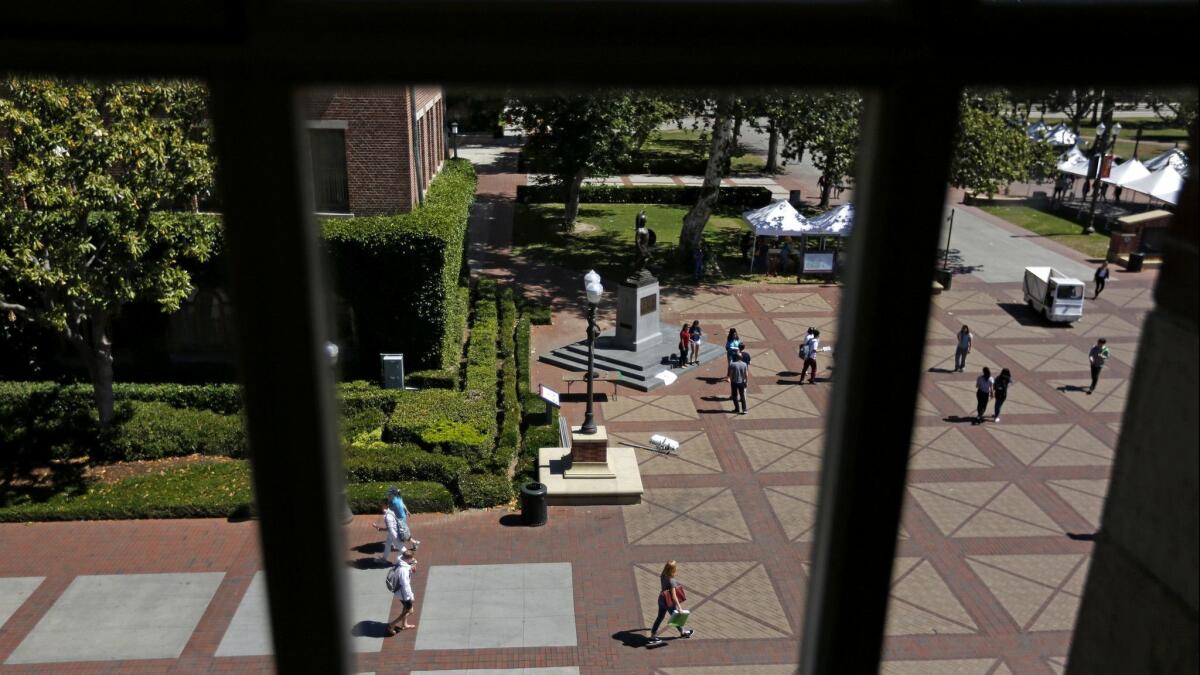Editorial: USC has investigated its recent scandals. Now it should release the results

- Share via
Confronted by scandal after scandal, University of Southern California leaders have followed a familiar pattern: Express shock and disappointment, call for an investigation to root out the school’s failings — and then keep mum on the findings of those investigations.
After a Times investigation revealed in mid-2017 that medical school Dean Carmen Puliafito took drugs and partied with a circle of criminals and drug abusers, then-President C.L. Max Nikias announced that the university had hired a former federal prosecutor, Debra Wong Yang, to conduct a “thorough investigation” into the doctor’s conduct as well as the university’s response.
Then, when The Times reported that Dr. George Tyndall, a gynecologist at the student health clinic, had been repeatedly accused over several decades of making sexual comments and touching young patients inappropriately, the Board of Trustees decided, again, to hire outside counsel to investigate the misconduct and reporting failures.
At USC, where secrecy and damage control has often trumped good governance, an investigation that is never made public is practically useless.
So whatever happened to those independent assessments? We’re still waiting.
Last week, the Concerned Faculty of USC — a group of professors formed in the wake of the scandals — demanded that the Board of Trustees release the completed Puliafito and Tyndall investigations “that have so far been kept secret.”
“USC must let the sun shine in,” the faculty wrote.
The promise of an outside, independent investigation is supposed to give people confidence that the truth will be uncovered and problems will be fixed. But at USC, where secrecy and damage control has often trumped good governance, an investigation that is never made public is practically useless. The Board of Trustees and administrators can’t possibly restore confidence in their leadership without addressing the mistakes of the past, honestly and transparently.
Enter the Fray: First takes on the news of the minute »
To that end, the university needs to explain to students, parents, faculty and the broader public not just what Puliafito and Tyndall did wrong, but how their misconduct was allowed to continue undetected and unaddressed for so long. That, in turn, requires administrators to figure out exactly where the process failed, as well as what cultural and institutional attitudes enabled complaints to be ignored or dismissed.
Rick Caruso, who chairs the Board of Trustees, said he still intends to release the results of the investigations, albeit in a form that doesn’t interfere with ongoing criminal investigations and doesn’t violate attorney-client privilege. That’s good. His goal should be to release as much information as possible.
The university is now ensnared in yet another scandal: As all the world knows, a high-ranking athletic administrator and three coaches stand accused of taking bribes to help wealthy parents get their kids into the school as fake athletic recruits. Interim President Wanda Austin said the university would conduct its own investigation into the admissions cheating scheme — and that study too should be made public. USC officials said Monday that the school cannot release any information while the U.S. Justice Department investigation is underway, and that’s fine. But this can’t be another secretive study that only gets aired behind closed doors.
Follow the Opinion section on Twitter @latimesopinion and Facebook
More to Read
A cure for the common opinion
Get thought-provoking perspectives with our weekly newsletter.
You may occasionally receive promotional content from the Los Angeles Times.








